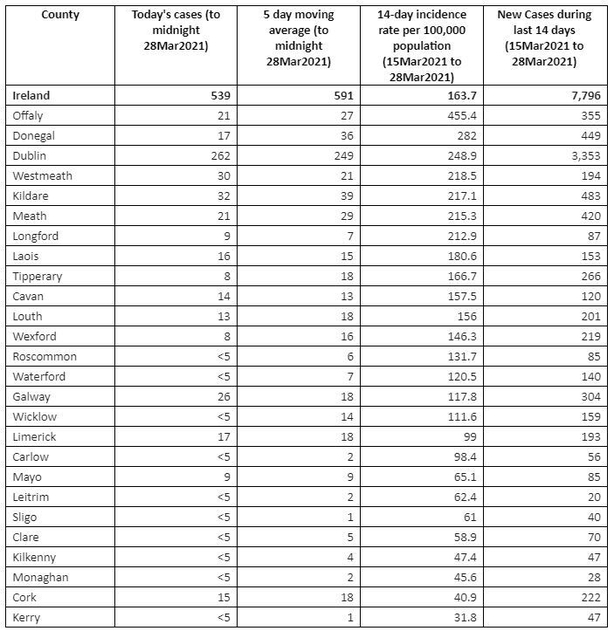The Department of Health has been notified of one further coronavirus-related death and 539 new cases.
In a statement, the National Public Health Emergency Team said that there has been a total of 4,667 coronavirus-related deaths in Ireland, and 235,078 confirmed cases.
Of today's cases, 288 are men and 249 are women, with 73% are under the age of 45, while the average age is 32.
There were 19 additional hospitalisations in the past 24 hours, bringing the total number of patients with the virus to 331.
There are 70 people being treated in intensive care.
NPHET said that the majority of the new cases - 262 - were reported in Dublin.
It said that provisional data reports 32 cases in Kildare, 30 in Westmeath, 26 in Galway, 21 in Meath, 21 in Offaly and the remaining 147 cases are spread across 20 other counties.
The 14-day incidence rate of the virus now stands at 163.7 per 100,000 population.
The counties with the highest rate of infection are Offaly (455.4), Donegal (282) and Dublin (248.9).
The counties with the lowest rate of infection are Kerry (31.8), Cork (40.9) and Monaghan (45.6).

As of last Friday, 26 March, 786,569 doses of the Covid-19 vaccine have been administered.
NPHET said that 567,023 people have received their first vaccine dose, while 219,546 people have received their second dose.
Meanwhile, NPHET is soon set to deliver its advice to the special Covid-19 Cabinet sub-committee, which convenes this evening.
Tomorrow, the Government will make a decision around easing some Covid-19 restrictions from next month.
Amid concern about the rising rate of the virus, there is still an expectation that some of the most severe Level 5 restrictions might be altered.
Elsewhere, a Dublin-based GP and member of the National GP HSE Advisory Team Dr Ray Walley said the biggest approach to exit the pandemic is "definitely" going to be vaccines.
Speaking on RTÉ's Drivetime, he said an increase in social interactions has led to a rise in case numbers.
He said the focus needs to be on getting people vaccinated as quickly as possible and to keep the disease levels reduced.
"And gradually, with the guidance of NPHET and Government, we can gradually open up", he said.
We need your consent to load this rte-player contentWe use rte-player to manage extra content that can set cookies on your device and collect data about your activity. Please review their details and accept them to load the content.Manage Preferences

